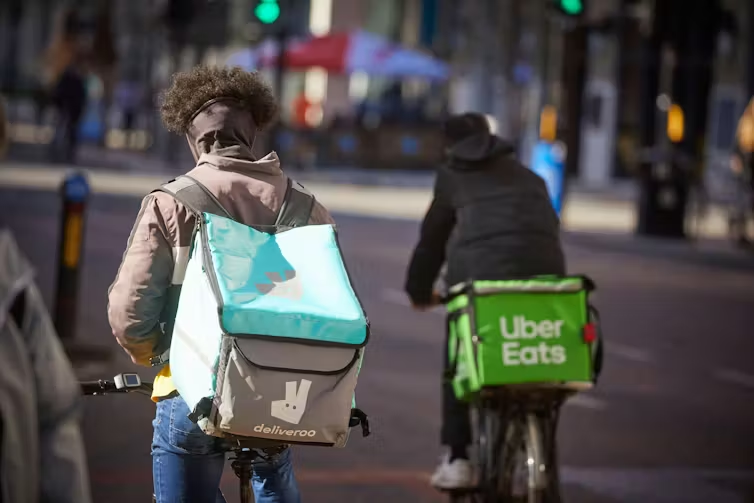A recent investigation has revealed that thousands of illegal migrants and asylum seekers are working as couriers for food delivery companies across the UK, earning up to £500 a week despite having no legal right to work. Many are using the income to repay debts owed to criminal smuggling networks that facilitated their entry into Britain via dangerous Channel crossings.
Despite the Labour government‘s push to reduce immigration, the gig economy—particularly takeaway and grocery delivery services such as Deliveroo, Uber Eats, Just Eat, and Stuart—has become a lucrative underground market for migrants housed in Home Office-funded hotels.
A System Open to Abuse
The investigation, conducted by undercover Telegraph reporters, found that migrants—many of whom arrived illegally and await decisions on asylum claims—are renting or borrowing courier accounts to work in violation of immigration laws. These accounts are sold or leased for £75 to £100 per week on a growing black market that thrives in major UK cities.
The Home Office revealed that in 2023, two in five couriers stopped during random checks were found to be working illegally. Many operate under substitute identities, using rented phones and accounts, and evade detection through sophisticated workarounds including shared facial recognition logins.
Couriers told The Telegraph they were compelled to work illegally due to mounting debt owed to smugglers, as well as pressure from families who had invested heavily in their journey.
One Afghan asylum seeker living in a Home Office hotel in London said he earns around £500 weekly delivering food. “My family lent me money to pay smugglers. I have to send it back,” he said. Like many others, he admitted to renting an app account from abroad—paying a middleman in Turkey £70 a week for access.
Sales Pitches from the Shadows
The Telegraph’s journalists also went undercover to speak with people smugglers based in Turkey, Iran, Afghanistan, and northern France, who actively market the UK as the best destination for illegal migration.
One smuggler in Istanbul declared, “Life in England is good… All you need is a mobile phone and a bike.” He added that once migrants arrive, they are given government-funded hotel rooms and can easily find “delivery work” while their asylum is processed.
Another trafficker in Dunkirk told a reporter posing as a potential migrant: “The government will feed you, give you shelter, and you’ll still make good money delivering food. England is the best.” reported by the Telegraph .
These operations were highly secretive, relying on encrypted messaging apps such as Telegram and WhatsApp. Smugglers boasted about their networks across Europe and promised fast, safe routes to Britain—often downplaying the risks of crossing the Channel.
The Hotel Courier Hubs
According to the report, many hotels housing asylum seekers have been transformed into unofficial courier depots. Dozens of bicycles, including illegally modified e-bikes capable of reaching 40mph, are parked outside entrances. Inside, residents have created makeshift workshops to repair and maintain delivery bikes. Some even act as informal mechanics for other riders.
Couriers say they often lack basic knowledge of UK road laws. One migrant confused a “Give Way” sign for “No Entry,” while another believed a slippery road warning meant a parking zone. Despite these misunderstandings, many continue to ride long hours, often under pressure to deliver multiple orders quickly and pay back mounting debts.
One Kurdish migrant told reporters he regretted coming to the UK, saying he felt “suicidal” after months of inactivity and stress caused by legal uncertainty and financial obligation.
Company and Government Response
Following the Telegraph’s revelations, major food delivery platforms issued statements defending their practices and reiterating their cooperation with the Home Office.
A Stuart spokesperson stated the platform performs “compliance checks” on right-to-work documentation and closes accounts involved in unauthorized activity.
Deliveroo said it was introducing daily identity verification and device ID checks to strengthen its platform. A Just Eat representative highlighted the company’s “biometric spot checks” and tough criteria for self-employed couriers, including criminal background and right-to-work documentation. Uber Eats confirmed that it was deploying new detection tools and removing fraudulent accounts.
Meanwhile, Dame Angela Eagle, the UK’s border security minister, said the government would soon introduce tougher legislation to combat illegal working in gig economy sectors.
“Companies who try to escape scrutiny will face fines of up to £60,000 per worker, potential prison terms, and the loss of their business licenses,” she warned. “We are working closely with firms like Deliveroo, Just Eat, and Uber Eats to ensure right-to-work checks are being enforced properly.”
The Cost of ‘Easy Money
The story paints a stark portrait of a system under strain, where economic desperation, legal ambiguity, and loopholes in the gig economy have converged to form a shadow workforce operating just beyond the reach of regulators.
For many migrants, the UK is not the land of effortless prosperity they were promised. Instead, it is a place of risk, moral compromise, and unrelenting pressure to meet obligations forged under duress. For British authorities, the situation exposes deep vulnerabilities in immigration control, labour enforcement, and digital platform accountability.
As the Labour government continues its immigration overhaul, the challenge of cracking down on illegal work while maintaining compassion for vulnerable asylum seekers will be a defining test in the years ahead.

